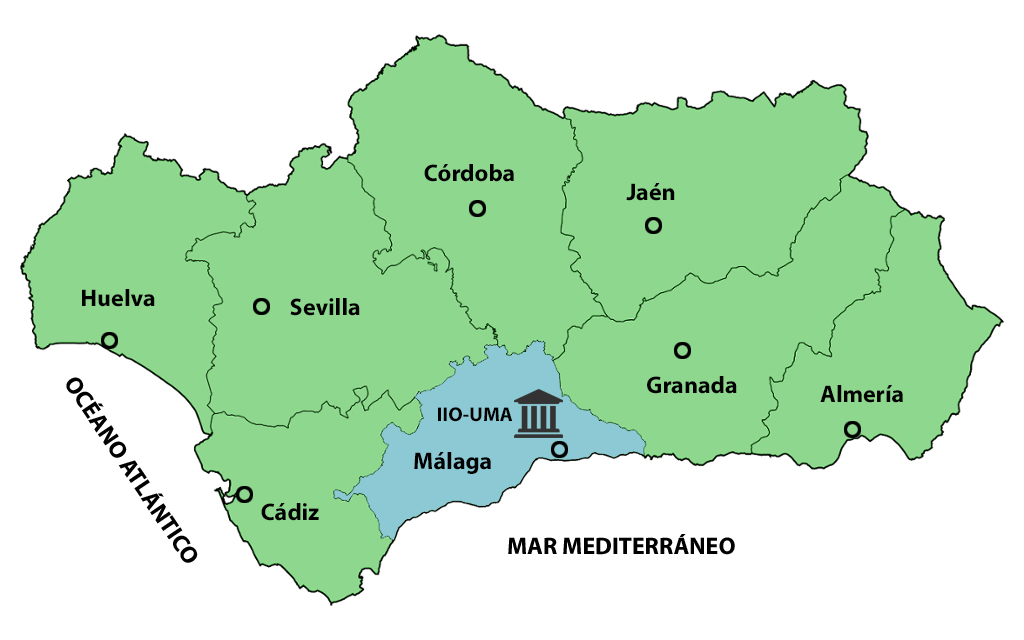Presentación del Instituto Universitario de Investigación de Ingeniería Oceánica
Reconocimiento
El Instituto Universitario de Investigación de Ingeniería Oceánica desea realizar un homenaje permanente al gran profesor Dr. Javier Poncela, que fue uno de sus miembros fundadores, por su dedicación a este proyecto y, en general, por su entrega inteligente y eficaz a la Universidad de Málaga.
Creación
La creación del Instituto Universitario de Investigación de Ingeniería Oceánica (IIO) de la Universidad de Málaga (UMA) fue aprobada en Consejo de Gobierno de la UMA el 28 de mayo de 2019 y ratificada por el Consejo Social de la UMA el 24 de julio de 2019.
El Instituto Universitario de Investigación de Ingeniería Oceánica de la Universidad de Málaga, IIO, se inspira en lo que la Unión Europea ha dado en llamar “crecimiento azul”, que es “…una estrategia a largo plazo de apoyo al crecimiento sostenible de los sectores marino y marítimo. Reconoce la importancia de los mares y océanos como motores de la economía europea por su gran potencial para la innovación y el crecimiento. Es la contribución de la Política Marítima Integrada en la consecución de los objetivos de la Estrategia 2020 para un crecimiento inteligente, sostenible e integrador”.
Málaga es una ciudad costera, con un importante puerto marítimo que presenta importantes intereses económicos y culturales relacionados con el mar. Estos intereses están, a día de hoy sin apenas explotar. La ingeniería oceánica, entendida como aquellas especialidades de la ingeniería que están relacionadas con el mar, debe ser una importante contribución a la economía local y regional. La provincia de Málaga tiene 175 km de litoral, que juega un papel principal en la economía provincial, ya que el turismo de costa es una de sus principales actividades. Cinco de las ocho provincias que componen la Comunidad Autónoma de Andalucía son costeras, y un mar y un océano bañan sus costas, a ambos lados del estrecho de Gibraltar, con un total de 910 km de costa.

Por otro lado, la Universidad de Málaga cuenta con tres grandes centros dedicados a la ingeniería: las Escuelas Técnicas Superiores de Ingenierías Industrial, Informática y de Telecomunicación. Las más importantes universidades andaluzas se encuentran en Sevilla y Granada, que no son ciudades costeras. Las Universidades de las ciudades costeras Huelva, Cádiz, Málaga y Almería sí cuentan con numerosos grupos e institutos universitarios de investigación dedicados a la biología, ecología, geología marinas, así como a la oceanografía física, pero estas universidades no habían reunido a sus ingenieros que investigan en tecnologías relacionadas con el mar en un instituto universitario de investigación. Todo ello nos condujo a pensar en la creación de un instituto que agrupase a esos investigadores y con el decidido apoyo del Vicerrectorado de Investigación y Transferencia de la Universidad de Málaga en 2019 se creó este Instituto.
Motivación
Nuestra vocación es desarrollar tecnologías, métodos y servicios que sirvan tanto para la conservación de los mares como que permitan su explotación sostenible, y al mismo tiempo se compartan las singularidades que introduce el entorno marino en los métodos propios de la ingeniería. Todo lo cual hace del IIO-UMA una organización multidisciplinar, pues sus miembros somos ingenieros y científicos de distintas ramas del conocimiento que estamos convencidos de que este tipo de colaboración es la principal creadora de sinergia. La ingeniería no debe olvidar nunca a una de sus dos principales fuentes -la Ciencia-, ni a los usuarios de su servicio. Es el motivo que hace que en el IIO-UMA se encuentren investigadores matemáticos, físicos, biólogos, ecólogos y geólogos. Varios de ellos son investigadores del Instituto Español de Oceanografía (IEO), importante institución en la primera fila internacional de la investigación marina. Además la organización es de tipo transversal al tratarse asuntos que interrelacionan distintas áreas económicas, como pueden ser, por ejemplo, pesca, energía, seguridad, turismo, transporte o comunicaciones.
La actividad de este Instituto estaría centrada en la Investigación técnica y científica (desarrollo e innovación tecnológica), la Formación (programas de doctorado y de postgrado), y la Consultoría (asesoramiento técnico). Algunas líneas de trabajo identificadas con los sistemas de radiodeterminación, la monitorización del entorno, los vehículos submarinos autónomos, el análisis de imagen para ayuda a la oceanografía, la generación de energía eléctrica en el mar, las redes de comunicaciones, el desarrollo de nuevos materiales y procesos de fabricación o la integridad de estructuras marinas.
Las medidas específicas de la política marítima integrada de la UE tienen tres principios:
- Conocimiento marino para mejorar el acceso a la información sobre el mar.
- Ordenación del espacio marítimo para garantizar una gestión eficaz y sostenible de las actividades en el mar.
- Vigilancia marítima integrada para que las autoridades tengan una mejor apreciación de lo que pasa en el mar.
Málaga es una ciudad costera española con importantes intereses económicos y culturales relacionados con el mar. Estos intereses están a día de hoy sin apenas explotar. La ingeniería oceánica, entendida como aquellas especialidades de la ingeniería que están relacionadas con el mar, puede y debe ser una componente importante de la economía local y regional. En este sentido, el Instituto también pretende ser un puente entre la Universidad y el entramado industrial, económico y social.
Por último, el Instituto también busca la formación de jóvenes investigadores en los campos de su actividad.
Líneas de investigación
Las líneas de investigación del Instituto surgen todas de los tres principios arriba mencionados. Principios que serían imposibles sin la existencia de las tecnologías adecuadas. En la actualidad, esas líneas son:
- Sistemas de posicionamiento y localización submarinos.
- Modelado y simulación hidrodinámicos de corrientes marinas.
- Sistemas de monitorización y de comunicaciones submarinos.
- Análisis de imágenes para ayuda a la Oceanografía.
- Nuevos materiales y procesos de fabricación para sistemas artificiales que operan en el mar.
- Nuevas herramientas para mejorar la resistencia a la corrosión.



